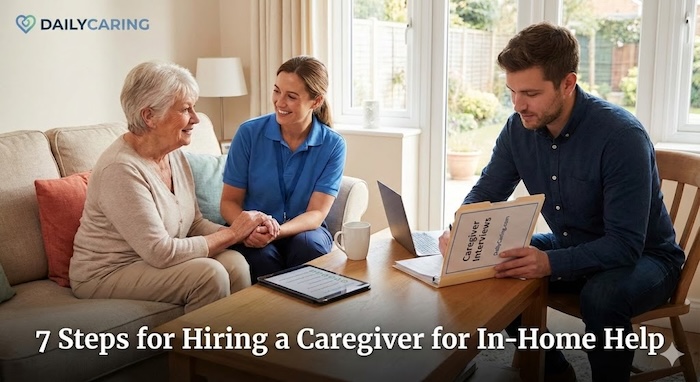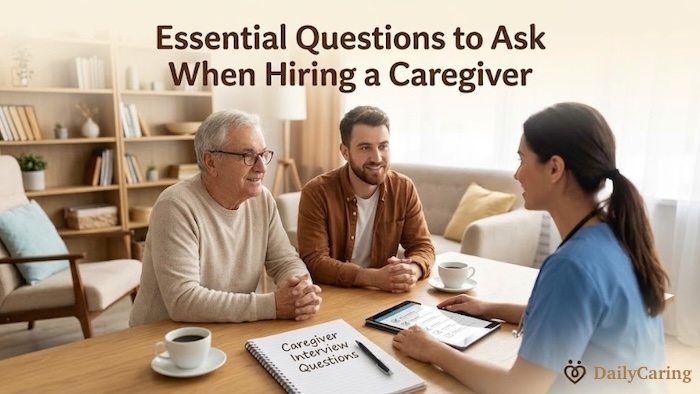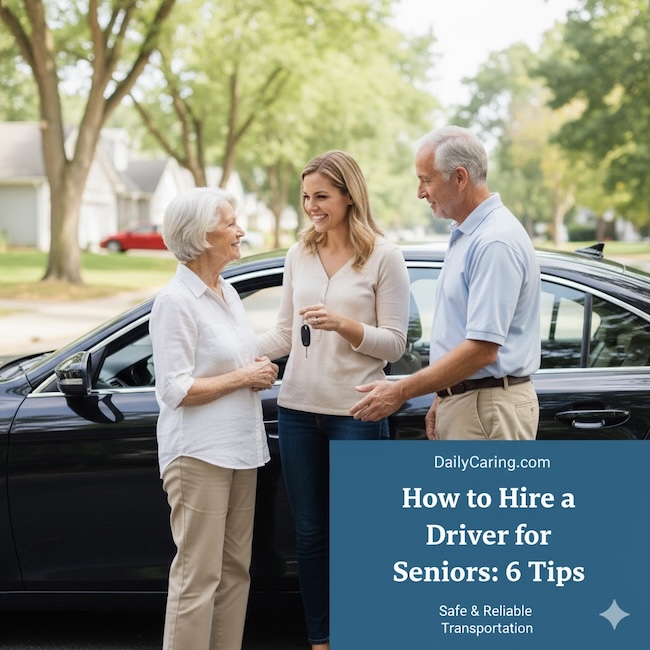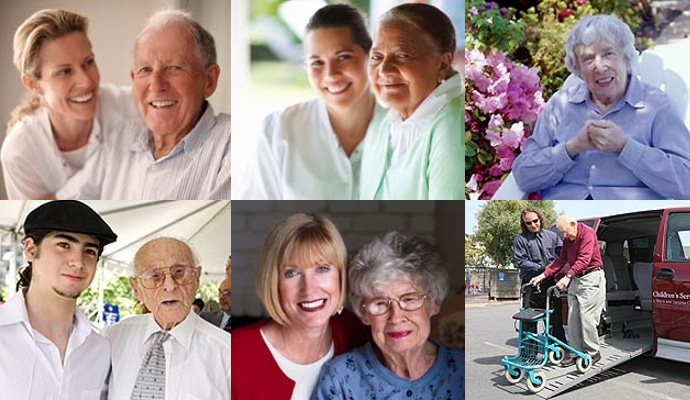Hiring an in-home caregiver can feel overwhelming. How do you find someone trustworthy, skilled, and compassionate enough to care for your aging loved one? Whether you need occasional help or full-time support, making the right choice requires careful planning.
In this article, we outline the seven essential steps to finding the right caregiver, from defining your needs to conducting interviews and checking references.

With this practical guide, you’ll gain confidence in selecting a caregiver who not only meets your loved one’s physical needs but also respects their dignity and independence.
7 Steps For Hiring a Great In-Home Caregiver
When hiring a caregiver for in-home help for your older adult, you’ll want to find someone who gets along with them and does a great job caring for them.
But caregiver hiring is easier said than done, especially if you've never hired anyone before.
To help you find someone wonderful, we share seven steps to walk you through the entire process.
Use these steps to find, hire, and keep the best person for the job.
1. Write a Clear Job Description
Writing a clear job description is essential to attract candidates who are both willing and able to care for your loved one.
To do this, carefully consider your older adult’s needs to ensure you include all the tasks you expect them to perform.
It may help to mentally walk through a whole week of care, hour by hour.
Creating a clear, specific job description will also help you determine the required number of care hours, the required flexibility, and the appropriate compensation.
2. Be Flexible and Fair About Pay if You’re Hiring Independently
Suppose you’re hiring independently rather than using an agency with non-negotiable rates. In that case, you may want to consider being flexible on compensation to interview the best candidates.
In the job posting, state that the hourly rate is flexible based on experience.
This often helps secure responses from more experienced candidates, and that extra experience may be worth a slightly higher rate.
It’s also essential to pay the going rate in your area.
If you offer to pay a lot less than the average rate, job applicants are less likely to have the care skills your older adult needs.
To get an idea of the hourly rates in your older adult’s area, look at postings for caregiving jobs that are similar to yours to get a sense of the average rates.
3. Pay Legally
You could try to save money by paying your hired caregiver cash “under the table” and skipping the employment taxes.
But if you or your caregiver gets audited by the IRS, it could mean big trouble that far outweighs any potential savings.
Creating your own W-2s and tax forms isn’t too tricky, but you can also get help from an accountant, use an online payroll service like Intuit, or use a caregiver-focused service like Care.com’s HomePay.
4. Have Multiple Interviews and a Trial Period
Interviewing a potential caregiver just once doesn’t give you enough information to make a good decision.
To get a more complete picture, consider having three interviews:
- A brief screening interview via phone to make sure they meet basic requirements
- An in-person interview to meet candidates who pass the phone screen
- An in-person interview where the top 1 or 2 candidates meet your older adult
An interview is one thing, but real life is something else entirely.
After selecting a strong caregiver candidate, it’s a good idea to arrange a trial period before making the role permanent.
This gives you a chance to observe how well they get along with your older adult and how they handle the caregiving tasks.
It also allows the caregiver to ensure the job meets their expectations.
5. Ask Plenty of Questions During the Interview
Asking questions during the interview helps you identify candidates who are responsible, trustworthy, and compassionate.
Here's a partial list of questions from Aging Today on how to determine one's caregiving experience and skills:
- How much experience do you have caring for older adults?
- Why did you leave your last job?
- Tell me about your education.
- What level of training do you have?
- Which areas of caregiving do you feel most confident in?
- Which areas of caregiving do you find most challenging?
- How much experience do you have working with people who have Alzheimer’s or dementia?
- How much experience do you have working with people who have chronic illnesses?
To read all of the questions, click here: Checklist: Questions for Interviewing a Private Caregiver
Don’t be afraid to ask questions about their experience or ask what they would do in specific situations that often happen with your loved one.
For example, if your older adult has dementia and incontinence, ask what they would do if your loved one refused their attempts to remove a dirty brief and get cleaned up. Or, ask how they would handle it if your older adult refused to take their medication.
For more ideas, check our list of questions to ask when hiring a caregiver here.
6. Check References
Even if the person you interviewed seemed fantastic, it’s still wise to do background checks and call all of their references.
Ask how the person performed on the job, if they would hire that person again, and if they’d recommend the candidate for your job.
Since older adults are at greater risk for fraud or abuse, it’s wise to check for a criminal record in all the states where the person has lived or been employed.
7. Sign an Employment Contract
Creating an employment contract is a crucial part of hiring a caregiver for in-home care.
A contract doesn’t have to be complicated. The purpose of the document is to lay out the details you’ve discussed clearly.
Both you and the caregiver sign the document to show that the job expectations are clear and that you both agree to the terms.
Be sure to include:
- Detailed job description
- Hours/schedule
- Pay rate and pay periods
- Anything else you’ve agreed upon during the interview process
Final Thoughts on Hiring a Caregiver for an Aging Loved One
Hiring the right in-home caregiver is a significant but manageable process that blends practical diligence with compassionate insight. By following these seven steps—from clearly defining the job to conducting thorough interviews and formalizing the agreement, you move beyond simply filling a position to finding a true partner in care.
This structured approach helps ensure you select someone who is not only qualified and trustworthy but also compassionate, respects your loved one's dignity, and enhances their quality of life.
Taking the time to hire carefully provides immeasurable peace of mind, allowing you to build a supportive and secure foundation for your family member's well-being at home.
Recommended for you:
- 3 Tips to Help You Choose Between Assisted Living vs In-Home Care
- When They Say No: 8 Ways to Introduce In-Home Care for Seniors
- 5 Ways to Keep an Eye on Your Senior’s In-Home Caregiver
About the Author

Connie is the founder of DailyCaring.com and was a hands-on caregiver for her grandmother for 20 years. (Grandma made it to 101 years old!) She knows how challenging, overwhelming, and all-consuming caring for an older adult can be. She also understands the importance of support, especially in the form of practical solutions, valuable resources, and self-care tips.














nice post
Thanks for the kind feedback! We’re so glad this article is helpful.
Theres nothing here about getting paid to take care of tile parents a waste of time
Yes, this article is about hiring someone to provide care. It sounds like you may be interested in our article How to Get Paid by the State for Taking Care of Someone: 3 Benefits Programs at https://dailycaring.com/getting-paid-as-a-family-caregiver-3-government-benefits-programs/
Can I get my daughter paid she gave up her home and moved in with me I’m fighting lung cancer radiation and chemotherapy she cooking and cleaning
It’s wonderful that your daughter is caring for you. This article shares info on getting paid for caring for a family member – How to Get Paid by the State for Taking Care of Someone: 3 Benefits Programs at https://dailycaring.com/getting-paid-as-a-family-caregiver-3-government-benefits-programs/
I have been reading posts regarding this topic and this post is one of the most interesting and informative one I have read. Thank you for this!
Thanks for the kind feedback! We’re so glad this article is helpful.
I amnòi. on the other side of the fence. I came to Alabama from California and got stuck here. I had no where to stay. My sis has a friend who is 100% disabled. I moved in to help her. Now it’s more than a full time job. I can’t even take a job. How can I get a set up for us? Or maybe someone to run this by so we can make a standard quality of life. My truck is down now. No way to fix it and walk
So sorry to hear about this situation. It’s very kind of you to take care of your sister’s friend. Perhaps there are local programs that can help. It would be a good idea to contact your county’s Area Agency on Aging to get connected to helpful organizations and find out about local resources.
More info here – Area Agency on Aging: Resources for Seniors https://dailycaring.com/area-agency-on-aging-resources-for-seniors/
Your article is a “nice start”, But not the most critical info. Seriously, you shouldn’t paint a rosy picture of caregivers.
Whether you hire directly OR you hire from an agency, each and every one of these items is critical.
I can share from experience you MUST run the caregiver hiring JUST like a business.
Fill out a COMPLETE job application w/Emergency Contact information. Emergency contact info should be name, address, phone number AND relationship to the caregiver. Then call the numbers and make sure it’s who they say it is and it’s ok to use them for emergency contact.
Anyone who is shady will not like the application and all that info and will not want to work for you.
CHECK ALL CNA, HHA certifications. Get the numbers, the dates, etc. Check your state’s certification confirmation website. Guess what? Some of them might not be real! Surprise!
LIVE SCAN: Get a LIVE SCAN on each caregiver candidate. Candidate should bring you a copy.
PHOTO COPY: Copy Driver’s License and Social Security card — just like your employer copied yours. Don’t be naive. Just do it.
WORKER’S COMPENSATION INSURANCE: If the care-ee owns the house, the Worker’s Comp insurance will be so low. Possibly as low as $500/year which is NOTHING compared to a stranger / caregiver hurting themselves, not being able to work for the rest of their lives and taking everything from your loved one’s estate and then come after YOU. Because remember…. YOU HIRED HIM/HER. Be smart. Just do it.
EMERGENCY BAG: We live in fire risk / earthquake risk / flood risk, so we have a red backpack with water, food, emergency supplies for 2 people for 3 days.
+ Full Emergency procedures for our caregivers + our loved ones.
Written instructions with Caregiver’s signature that she has read it and knows what to do.
BEFORE HIRING or even letting them in the house to meet your loved one:
INVENTORY: Take photos and complete inventory of everything in the house. (because some of the most random things will “disappear”.) . Every closet, Every drawer, Every cabinet in the kitchen – even the kitchen closet. A COMPLETE inventory. (believe it or not, ours stole an old IRON , pyrex dishes and an old BROOM, So crazy. )
Photograph everything in your loved one’s purse, so you know what is there.
Date it. Check it weekly.
POLICE: It’s also a good idea to let the caregivers know, in the interview, that a complete inventory has been taken of everything in the house. And that your procedures, if anything is missing is to notify the police. Let them know the police will come and interview all caregivers. Write this out and be sure they sign it. The shady ones will, again, not want this job. The good ones will say, “Right on! You’re very smart to do that.” The shady ones will not want to work for you. Disaster averted. Good for you.
Remove any valuable jewelry. (because it will ALL disappear — even if it’s in a safe or on their EARS. They will crow-bar the safe open no matter how strong you think that safe is. And they will take jewelry off of their body.) If you’re loved one thinks YOU’RE the one stealing from him/her, let him/her go with you to the bank and put the jewelry in safety deposit box and let him/her keep the key. (of course you have a copy)
OTHER INFO: Once hired, you’ll need Automobile information – Auto license, color, make and model of the car. Why? Because you’ll need it if they end up being crooks. And you’ll need it if there is a fire, earthquake, flood emergency.
RING / VIDEO DOORBELL: A video doorbell for front door and back door. Don’t think twice about it. Just do it. You must know / see all who are coming and going so that in case the caregiver hires shady attorney’s to come and transfer power of attorney OR medical power of attorney to the caregiver and take it away from YOU – you can see the cars and faces of the attorneys and put a stop to their illegal practices.
PAY ALL EMPLOYMENT TAXES, otherwise the caregiver is putting YOU at risk for tax evasion. Just what you wanted, right??? Get robbed AND have the IRS hounding you. Be smart. Just pay it.
MAKE REGULAR, RANDOM, UNANNOUNCED, SURPRISE VISITS. You’ll be surprised what you see and smell. And the caregivers will shape up pretty fast. Or they’ll quit. Good riddance.
LOCKBOX: NO CAREGIVER SHOULD HAVE A KEY TO YOUR HOUSE. Get a lockbox, put it on the back door and let them open it every day to get in the house. If they manage to get an extra key made (and they will) see next step. (You have a RING/VIDEO DOORBELL so you see them do it every day.)
WHEN CAREGIVERS LEAVE (every single time) CHANGE THE LOCKS ON THE DOORS. It’s a minor expense compared to the theft that will happen if you don’t change the locks.
Don’t be stupid.
Keep your loved one and your extended family safe.
If you think these procedures are expensive, they are INEXPENSIVE compared to the loss of trust, the loss of safety, the loss of your loved ones’ belongings and the loss of emotional security your loved one will feel when he/she finds out his/her favorite caregiver is a thief.
If you do all of these things and somehow you still get robbed, you’ll have everything you need to try and get justice and prevent the caregiver/thief/crook from hurting someone else.
POLICE are required to investigate every instance of elder abuse.
Stealing from elders is a form of abuse.
And it’s one step away from physical abuse.
GOOD LUCK and GOOD NIGHT.
It’s important to do the due diligence before hiring someone and to take reasonable precautions against potential theft, but it’s not helpful to assume that every hired caregiver is so dishonest or abusive. To find a kind and caring person to help care for an older adult, it’s essential to interview the person and thoroughly check their references before making a hiring decision.
This seems more realistic and I am happy to have read through the comments. Than you – we’re struggling as a family to identify “someone” to care for my grandmother. Thanks to you both for taking the time to help us!
You’re very welcome! We’re so glad that this article is helpful and hope that you’ll find someone wonderful to help care for your grandmother.
thank you so much for all these incredibly important details… unfortunately they are necessary. I agree that you should prepare for the worst, hope for the best. Its a brutal time and you dont want to make it worse by being vulnerable to a theft or worse.
I would like to add a few points…
Know that the person you hire is going to be part of your daily life and will be essentially part of your family…do your best to assess that they will do what you ask, respect your word and not continually second guess you. Advice and input are helpful but not someone who insists they know better for your loved one than you and then does wtf they want when your not around. So professionalism & qualifications, over superficial sweetness. Hard to assess up front, but consider it. Talk to folks that have worked directly with them.
Also, I would recommend stating up front terms for termination, and make sure any other family members are in support of those terms.
Good luck, I hope you dont need it.
Great article. If I may add to the article another important factor that cannot be overlooked. Insurance. Most homeowners insurance policies doesn’t carry liability and worker’s compensation and those that do might not have the proper levels. The home owner is essentially the employer and is responsible for paying all federal, state and local taxes like it states in the article, but is also held responsible if the caregiver hurts themselves while working. It is recommended to check with your insurance company on what is needed on your policy to hire someone before committing.
Great point, thanks for sharing!
You are correct, Scot Cheben. See my comments. Worker’s comp is only the beginning!